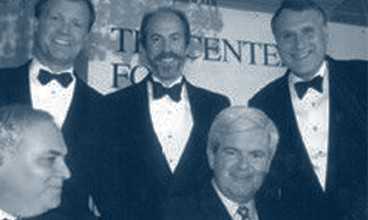1996 Keeper of the Flame Award: Newt Gingrich

 Last night, the Speaker of the House of Representatives, Newt Gingrich, delivered an address concerning U.S. security policy that can only be described as Churchillian in its intellectual breadth, its candor and its grave warning: “The democracies are in a greater danger than they have been at any time since Stanley Baldwin lied to the English people about the Luftwaffe and Hitler’s Germany” — a moment when freedom-loving nations failed to deal in a timely and effective manner with emerging threats and paid dearly and in blood for their inaction.The occasion for Speaker Gingrich’s stirring speech was his acceptance of the Center for Security Policy’s 1996 “Keeper of the Flame” award. His receptive audience of nearly 400 Members of Congress, diplomats, high ranking military officers, former senior government officials and other accomplished security policy practitioners included: Sen. Jon Kyl (the 1994 recipient of the “Keeper of the Flame” award), Reps. Floyd Spence and Ben Gilman (the chairmen, respectively, of the House National Security and International Relations Committees), former Army Chief of Staff Gen. Gordon Sullivan, former UN Ambassador Jeane Kirkpatrick and former National Security Advisor to the President Richard Allen.
Last night, the Speaker of the House of Representatives, Newt Gingrich, delivered an address concerning U.S. security policy that can only be described as Churchillian in its intellectual breadth, its candor and its grave warning: “The democracies are in a greater danger than they have been at any time since Stanley Baldwin lied to the English people about the Luftwaffe and Hitler’s Germany” — a moment when freedom-loving nations failed to deal in a timely and effective manner with emerging threats and paid dearly and in blood for their inaction.The occasion for Speaker Gingrich’s stirring speech was his acceptance of the Center for Security Policy’s 1996 “Keeper of the Flame” award. His receptive audience of nearly 400 Members of Congress, diplomats, high ranking military officers, former senior government officials and other accomplished security policy practitioners included: Sen. Jon Kyl (the 1994 recipient of the “Keeper of the Flame” award), Reps. Floyd Spence and Ben Gilman (the chairmen, respectively, of the House National Security and International Relations Committees), former Army Chief of Staff Gen. Gordon Sullivan, former UN Ambassador Jeane Kirkpatrick and former National Security Advisor to the President Richard Allen.
The Speaker focused on the imperative in a democracy of educating the public about the true nature of threats to vital national interests. This requires political leaders, in his words, to address such threats with “clarity, coherence and consistency.”
As noted in a Decision Brief issued yesterday(1), the Center for Security Policy believes that the 1996 presidential election campaign offers an unparalleled opportunity for just that sort of public education. And there could hardly be a better catalyst for the debate this fall than Mr. Gingrich’s powerful statements concerning, among other things:
- The need to replace CIA Director John Deutch with “someone who believes in the CIA” and who will greatly enhance the size and effectiveness of U.S. human intelligence operations.
- The responsibility to develop strategies for dealing with coming challenges to U.S. security not only from criminal elements and terror-sponsoring states, but also from great powers like China and Russia.
- The necessity of isolating — rather than negotiating with — Syria as long as it remains a state-sponsor of terrorism.
- The requirement for prompt deployment of national anti-missile systems to end America’s current, utter vulnerability to ballistic missile attack — a requirement the Clinton Administration has attempted to deny by politicizing relevant threat assessments.
1. See What ‘Reagan Democrats’ Really Care About: Safeguarding America’s Interests in a Dangerous World (No. 96-D 87, 18 September 1996).
- Military Starship: How SpaceX Is About to Make America Globally Dominant - March 4, 2025
- The Cautionary Tale of Zheng He - December 4, 2024
- Frank Gaffney departs CSP after 36 years - September 27, 2024
